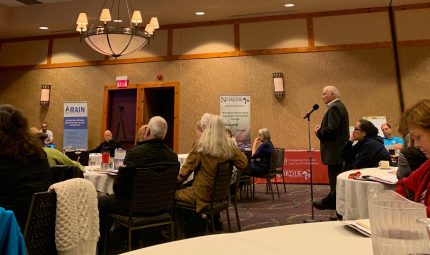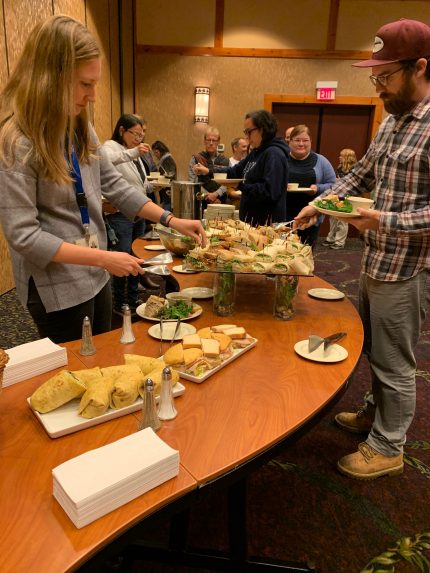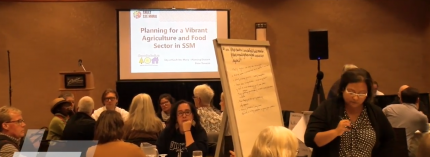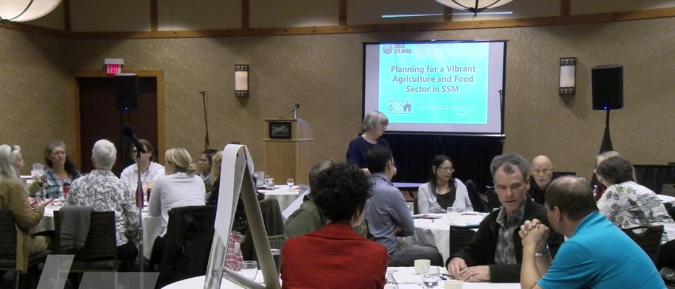The Consequences of Canada’s New Food Guide: a Bring Food Home Regional Conference Summary
Posted: November 5, 2019
Categories: Events / GoodFoodBites / News from Sustain Members / News from Sustain Ontario
 The first of four Bring Food Home 2019 Regional Conferences took place on October 10th in both Ottawa and Algoma via video conference, with Just Food and the Algoma Rural Agri-Innovation Network co-hosting a province-wide panel and discussion on the systems-wide consequences of Canada’s new Food Guide!
The first of four Bring Food Home 2019 Regional Conferences took place on October 10th in both Ottawa and Algoma via video conference, with Just Food and the Algoma Rural Agri-Innovation Network co-hosting a province-wide panel and discussion on the systems-wide consequences of Canada’s new Food Guide!
It was a lively discussion that explored how we can support our regional food systems, how the new food guide can shape our food systems and change where we get our food, and what this means for agriculture, producers, community organizations, government and eaters.
Powerpoints from the morning panel, as well as the afternoon event that continued in Algoma, are now available online and we encourage you to check them out: http://rainalgoma.ca/resources/
Thank you to Just Food and the Algoma Rural Agri-Innovation Network for hosting this important, well-attended discussion and bringing together such an exciting panel!
 Below are summary findings and insights that have been provided by the event hosts:
Below are summary findings and insights that have been provided by the event hosts:
Overall Findings
Overall, the needs and challenges voiced at the Bring Home Food Forum presented valuable information that will inform the future directions community members will take in supporting the regional food system.
Education/Knowledge Transfer:
Whether is was examining the impacts of the Canada Food Guide regionally, or ways in which communities and organizations can support a regional food system, participants identified education as a major theme. Educating our youth in where food comes from, how it’s produced, and the skills that come with gardening, preserving, foraging, etc. is seen as an invaluable means of sustaining our unique regional food system. For First Nations communities in the region, the transfer of knowledge about food and agriculture is essential in bridging intergenerational knowledge gaps. Participants identified that the youth have a unique perspective as they don’t have conditioned biases and face less barriers. Educational gardening, meal prep skills, preservation skills, farm visits, etc. were some proposed examples.
Cultural Competency:
Participants from across the region expressed that cultural competency, diversification and collaboration is essential to our unique regional food system. Participants noted that cultural foods and traditions were not recognized as legitimate components in our food system. Participants suggested that we should be recognizing solidarity between culturally diverse foods and traditions. It was also noted that there should be a re-evaluation of priorities and modern agricultural practices that should be more inclusive of Indigenous and newcomer communities. This can be achieved through education, collaboration and sharing.
Collaboration and Coordination:
Many of the participants recognized that in order to support the regional food system that collaboration will have to be a priority. The Participants noted that food is a way to bring people together and that working together through cohesive planning and collaborative practices the local/regional food system can be strengthened and sustained. Participants suggested that this work can be done through increasing community participation in different networks, events, clubs and associations and by coordinating school boards, municipalities, First Nations, service clubs, businesses, etc. in the regional food economy. Building trust and capacity through meaningful communication and working together is essential to the regional food systems longevity.
Health and Equity:
Examining the Canada Food Guide and the regional food system, participants brought forward numerous health and equity implications and impacts for consideration. Participants questioned how a healthy and local diet can be incorporated into institutions such as hospitals and schools, etc. Participants noted that the Food Guide ignores eating locally and does not take into account factors such as financial constraints to eating healthy and local, time management, planning and preparing, shopping frequency, affordability, religious restrictions on diet, etc. By not taking these concerns into consideration, participants noted that there could be an increase in the greater equity gap.
Diversification and Sustainability:
Many participants stated that it would be beneficial to have a local/regional Canada Food Guide that takes into consideration what is produced and provided in the region and how people eat depending on where they are living. It is evident that when examining the regional food system, in order to be sustainable long-term, local producers will need to diversify their production and processing practices. Participants noted that a lot of production is processed by big corporations outside of the region and that they would like to see this processing happen locally. Participants stated that they would like to see some more research and development to determine the feasibility of this. Participants also noted that they would like to see more varied crop production in the form of fruit and nuts and whole grains. In order for the regional food system to be sustainable local farmers will need support and incentives to enter new markets and policies will need to be changed. Shoppers will need to educate themselves about the food that is produced locally and where it is accessible in order to support local producers. The regional food system will need to overcome the impacts of seasonal agriculture and the health of the environment in order to be sustainable long-term.

